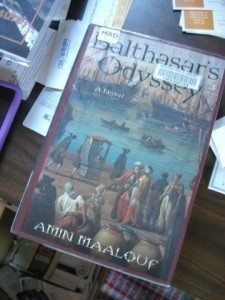Book Review: Balthasar’s Odyssey by Amin Maalouf
 I loved history enough to major in it in college, and literature enough to give it an equal study. So to find a novelist that blends the two so well together is a treasure for me. I came across Amin Maalouf in a bookstore in Ankara while I was living in Turkey. Others had recommended The Rock of Tanios and Leo Africanus. I was an immediate fan of the Lebanese-born author, and have read several other works. Some is nonfiction such as his The Crusades Through Arab Eyes
I loved history enough to major in it in college, and literature enough to give it an equal study. So to find a novelist that blends the two so well together is a treasure for me. I came across Amin Maalouf in a bookstore in Ankara while I was living in Turkey. Others had recommended The Rock of Tanios and Leo Africanus. I was an immediate fan of the Lebanese-born author, and have read several other works. Some is nonfiction such as his The Crusades Through Arab Eyes (very important to read if you are heading to the Middle East, I’d say).
I finally got around to one his most recent books, Balthasar’s Odyssey. Set in 1666, “The Year of the Beast” it is the story of a Genoese book merchant born and raised in the Levant who sets out on a journey to find an apocryphal work known as The Hundredth Name (of God). The story is engaging, a bit of a man’s quest for his beloved but also a course in 17th-century culture and geography in the Mediterranean, Levant and Europe. Much insight into superstitions and religious prejudices emerges in the character’s challenges to find the book and an impossible love. Balthasar is the narrator, a charming elder gentleman with a lot of pride and decency, a man bearing a Genoese name that once was high society but had lost the influence of its past. He passes through Constantinople, Chios, Smyrna (Izmir), parts of Syria, and even bears witness to the Great Fire of London.
The story has no lack of adventure and the magical book is the rabbit that lures the greyhounds on. In the end, of course, it’s the journey, not the destination that matters, and along the way the reader passes important points of history – the Great Fire, naval battles between the English and the Dutch, the rise of a Jewish Messiah within the Ottoman Empire who the average reader will likely never have heard of.
Balthasar is a sympathetic character and as a reader one feels for his suffering for moral quandaries, loves lost, and a search for where he truly belongs as a man who is always the foreigner. This is a work of fiction, but nevertheless I found myself heading to Google to check up on some of the interesting cultural and historical references to enrich my own understanding of the Levant, the Ottoman Empire, the conflicts of the Mediterranean, and even the political climate of the day (and its influences on today).
These days we are still dealing with superstitions and religious/cultural bickering and the wars that rise from such, and the idea of a coming Apocalypse still rears its ugly, and ultimately foolish, head from time to time, with the believers and doomsday criers ending up appropriately mocked when the expiration date passes without fire and brimstone. To take part in the uncertainty of even a very rational doubter in a bygone age is a look at where we were and how far (or not so far) we have come.
(See also Maalouf’s excellent nonfiction book on the subject of identity: In the Name of Identity: Violence and the Need to Belong)




 ORDER YOUR COPY TODAY!
ORDER YOUR COPY TODAY! ORDER YOUR COPY TODAY!
ORDER YOUR COPY TODAY!
You should read “The rock of Tanios”. It’s based on facts and existing places.
The Rock of Tanios was the first Maalouf book I ever read. Loved it! I was living in Turkey at that time (1997) and he became my new “favorite”.